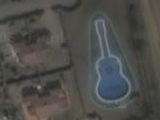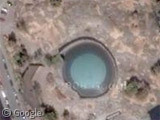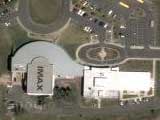Plymouth Rock
Thursday, 22nd November 2007 by James Turnbull
Today, the fourth Thursday of November, is the American holiday of Thanksgiving.
The Thanksgiving festival traditionally thanks God at the end of the year's harvest, and is a tradition passed down from the Plymouth Colony who settled in New Plymouth in 1620.
When these Pilgrims first landed they apparently stepped on what is now known as "Plymouth Rock", a large piece of granite which is currently housed in the rectangular building on the shore.
The rock wasn't identified as being of any significance until over a hundred years later in 1741, when an elder of the church pointed it out as being "the stone".
Since then it's been broken in two, dragged all around Plymouth, and had numerous chunks removed. Its current resting place was built in 1920 and puts the rock back at sea level.
Happy thanksgiving to all our American readers!
Wikipedia: Plymouth Rock, Plymouth Colony & Thanksgiving
Thanks to Steve Ransom, AndrewAnorak & John





I was astonished at this when I visited Plymouth. I had assumed that Plymouth Rock was some sort of geographical feature. An outcrop. A promontory.
But it really is just a boulder.
http://hnn.us/articles/406.html says that boulder is just a boulder in any case.
It really is quite unremarkable, actually. Here it is back in 1997 when I saw it: http://photos.dtpbylee.com/NewEngland1997/NewEngland1997_132
For an idea of size, those are pennies all over the top of it.
And here’s a ground-level shot of the construct that covers it: http://photos.dtpbylee.com/NewEngland1997/NewEngland1997_131
Actually, no.
God is not really involved here, Thanksgiving (at least in the US) is considered a secular holiday. See e.g. pilgrimhall.org
I find it amazing how unimaginative the settlers were with place names. If you zoom out a little and turn on the map. The first thing you see is Plymouth, probably the port where they left from! This is just down the road from Weymouth (sounds familiar) which is just south east of Braintree. Further south we come across Middleboro (clearly a Middlesbrough rip-off) finally across the bay we find Truro. I suppose they must have just been a little too tired after their journey to come up with original town names and just copied the English.
Mrb, keep in mind most of the settlers landing in “New England” were in fact English! There is a reason they named everything after things from their home country.
Yes, Gloucester, Worcester, Essex, Avon, Newton, Chelsea, even Boston; New England is full of Old England names. Either that or Algonquin names.
I understand that Mike but these people were the greatest pioneers of their day, starting a new life and creating a new country making history with every step they took and every building they made, I just find it a little strange that with all the tremendous challenges they faced finding original place names wouldn’t have been that hard. I actually think they were probably home sick and missed England and wanted to go home and it was all a big mistake and they regretted ever getting on that Bloody Mayflower!
But Mrb, they weren’t explorers happy to discover a new land, they were farmers and other laymen who were desperate to escape religious perseuction. They named things pretty much as you’d expect them to after being at sea for months and months.
middlesbrough didnt even exist in 1620, you are about 200 years off the mark there, so no, its not clearly a m’bro rip off…. The original stone steps ( some say, the embarkation point to the mayflower ) on the quayside, still exist in plymouth uk today, complete with a quaint little plaque for all the tourists.Try a search for “mayflower steps” if interested.
Not to start an argument, but Thanksgiving is without question a religious Holiday practiced in the states. Like many other religious holidays (Christams, Easter, even Halloween) The religious significance has been dilluted significantly, but Most Christian and protestant Americans recognize Thanksgiving as a day to give thanks to the Lord for his bounty. That may not have been the original intention of the Pilgrims, but Throught Americas (brief) History, most people recognize Thanksgiving as honoring God (or Allah, or Buddah, or whoever)
Whatever, You Use Way Too Many Capital Letters.
Wow…
ACTUALLY, Thanksgiving is based on the Native American tradition of thanking the earth for a bountiful harvest. It’s not religous. Much like the land and resources, the settlers stole this tradition and made it their own by adding Turkey (WAS a celebration of the 3 sisters: corn, squash and beans) and a bunch of marketing nonsense.
And these great pioneers also managed to enslave and kill virtually ALL the natives, so…..KUDOS to them.
Plymouth was not actually the first place the Pilgrams landed. I seem to recall that they first landed near the location of Provincetown on Cape Cod but decided it wasn’t a suitable location for their colony.
@ Dan, sorry I apologise for my ignorance and lack of historical knowledge. In fact I am so sorry I have given myself 20 lines.
I must not go fishing for Yanks I must not go fishing for Yanks I must not go fishing for Yanks I must not go fishing for Yanks I must not go fishing for Yanks I must not go fishing for Yanks I must not go fishing for Yanks I must not go fishing for Yanks I must not go fishing for Yanks I must not go fishing for Yanks I must not go fishing for Yanks I must not go fishing for Yanks I must not go fishing for Yanks I must not go fishing for Yanks I must not go fishing for Yanks I must not go fishing for Yanks I must not go fishing for Yanks I must not go fishing for Yanks I must not go fishing for Yanks I must not go fishing for Yanks
Reading ‘Plymouth Rock’, first thing which occurred to me was Malcolm X’s famous quote:
“We’re not Americans, we’re Africans who happen to be in America. We were kidnapped and brought here against our will from Africa. We didn’t land on Plymouth Rock – that rock landed on us.”
Here’s the video: http://tinyurl.com/2lt3a4
how does one fish for yanks??
Being an American I have to agree with Google Guy’s comments, with a couple of exceptions: It was the Pilgrims intention to thank God as well. I think they would have driven you out of town with sticks if you tried to thank Allah, or Buddah.
A couple of comments on the above interpretation(s):
Plymouth Rock: There is no contemporary source that sites any rock as a landing point at any time during the exploration to find a suitable location for settlement by the “Pilgrims.”
Religious Persecution: Only about half of the people who crossed the Atlantic on the Mayflower were “Separatists”, or religious nonconformists who had exiled themselves to Holland (not all “Separatists” moved out of England, but if you were one and didn’t, you could probably guarantee some jail time). As far as the rest of them go, all evidence points to their being members of the Church of England and pretty contented with that fact. The only factor in the whole venture that would attract “Separatists” and C of E folks is the fact that everyone who signed on with the company could expect to receive a pretty large piece of land after the company dissolved in 1627.
Thanksgiving: In the US, Thanksgiving is primarily a secular holiday today. The holiday was introduced during the American Civil War in 1863 as a representatively “unifying” factor–looking back to the “pilgrims” as the beginning of American religious freedom and representative government (see Religion comment above, and as for representative government, they were electing from among themselves, but no one was happy about that). The “First Thanksgiving” upon which the holiday is loosely based is a harvest feast that occured in 1621 with about 90 Native Americans and around 50 “Pilgrims” set over about three days sometime between September and October. The term “thanksgiving” in a 17th century context means a day of fasting and prayer to give thanks to God for a blessing conveyed upon the community, so the “Pilgrims” never would have viewed their harvest feast (which happened only that one time) as a thanksgiving of any kind.